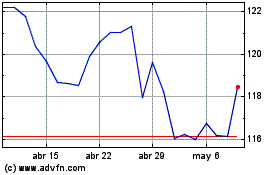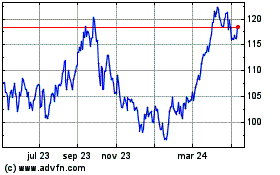Attorney General Drops Two Exxon Fraud Counts -- WSJ
08 Noviembre 2019 - 2:02AM
Noticias Dow Jones
By Corinne Ramey
This article is being republished as part of our daily
reproduction of WSJ.com articles that also appeared in the U.S.
print edition of The Wall Street Journal (November 8, 2019).
The New York attorney general's office Thursday dropped part of
its securities-fraud case against Exxon Mobil Corp. on the final
day of a rare climate-change-related trial that has pushed the oil
giant's accounting practices into public view.
Attorney general's office lawyers withdrew two fraud counts at
the end of a nearly three-week trial examining Exxon's public and
private estimates of potential climate-change regulations on its
future business. But the attorney general's office proceeded with
two counts that require the elements of the Martin Act, a New York
state antifraud law with a lower bar of proof: that Exxon made
misrepresentations to investors and that those deceptions
mattered.
The attorney general's office pulled back the civil fraud counts
during closing arguments of a trial that has been closely watched
for its implications for the largest American oil company and the
energy industry in general.
Attorney General Letitia James has accused Exxon of deceiving
its investors about its financial modeling for policies that
countries might enact to combat climate change. The oil company
told investors it used one formula to account for these future
regulations, but internally used lower numbers, the office has
argued.
Jonathan Zweig, a lawyer in the attorney general's office, said
the case wasn't about whether Exxon's employees were good people,
as the company's lawyers suggested. "The question in this case is
whether Exxon's disclosures were accurate," Mr. Zweig said. "And
the evidence shows that they were not."
Lawyers for Exxon have called the case meritless and said
reasonable investors wouldn't expect to know such proprietary
calculations. "Exxon Mobil did not have two sets of books,"
Theodore Wells Jr., a lawyer for Exxon, said Thursday. "Exxon Mobil
had two distinct metrics that were used for different
purposes."
In court Thursday, Mr. Wells, who represents Exxon, asked the
judge not to drop the fraud counts, saying the company had a right
to receive a ruling on those claims. The claims had damaged the
reputation of the company and its executives, he said.
"That leaves a cloud over the reputation of the people," he
said. "Because of this case, and it's all connected, we have got
copycat cases tracking this case word-for-word in private
federal-securities cases, books and record cases," Mr. Wells
said.
Mr. Wells said the Massachusetts attorney general had recently
sued the company as well. A spokeswoman for the Massachusetts
attorney general didn't respond to a request for comment.
State Supreme Court Justice Barry Ostrager said that while he
believed the New York attorney general had a right to withdraw the
claims, he would read the lawyers' written arguments on the matter.
He has indicated he would rule on the case in as little as a
month.
If Justice Ostrager rules in favor of the attorney general, it
could spur further lawsuits or investigations into Exxon and other
oil companies. A ruling in Exxon's favor would likely insulate the
company against such claims, and, from the company's perspective,
bolster its reputation on climate-change issues.
Either side would likely appeal the judge's ruling.
Write to Corinne Ramey at Corinne.Ramey@wsj.com
(END) Dow Jones Newswires
November 08, 2019 02:47 ET (07:47 GMT)
Copyright (c) 2019 Dow Jones & Company, Inc.
Exxon Mobil (NYSE:XOM)
Gráfica de Acción Histórica
De Mar 2024 a Abr 2024

Exxon Mobil (NYSE:XOM)
Gráfica de Acción Histórica
De Abr 2023 a Abr 2024
